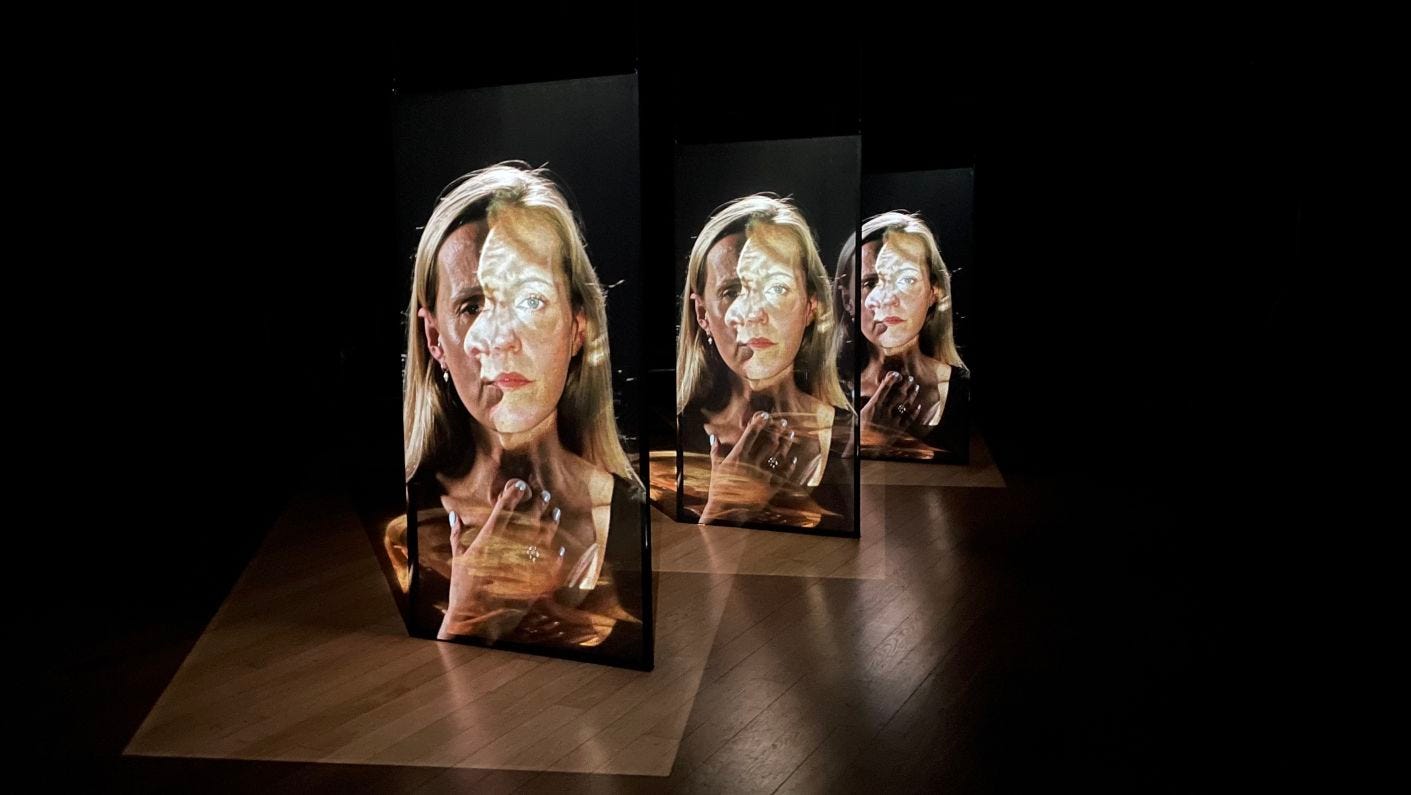Damaged voices with the strength to walk towards the light
The Sound Voice Project staged at The Royal Opera House’s Linbury Theatre tells the searing story of people who have lost theirs
I shall never take my voice for granted again. The Sound Voice Project staged at The Royal Opera House’s Linbury Theatre tells in short operatic form the searing story of people who have lost theirs. Through devastating laryngeal cancer, Parkinson’s, or motor neurone disease.
Only to find them again by summoning the courage to use restorative surgery – aimed at creating only a basic, husky voice - to sing out defiantly and with optimism. Sound advice. Don’t mess with the Shout at Cancer choir!
Fascinated, moved, uplifted, humbled, I sat on the 87 evening bus back to Wandsworth watching early Christmas London flexing its glittering festive muscles, in awe at the wonderland of triumphant self-belief in which I had been privileged to spend the previous couple of hours.
Let the composer and director, Hannah Conway, tell us the ‘why’ story. Conway is internationally acknowledged as having a passion for bringing new stories, experiences, and technology to bear on the operatic medium.
“The Sound Voice Project started as a series of conversations between 2016–9 with my friend and colleague Phillipa Anders at Britten Pears Arts. It was a deeply personal passion project from the start and I’m so proud now of the special team and friendships it has become. When my dad lost his speech, it was devastating; unthinkable to lose that precious connection.”
Conway gathered a posse of unlikely collaborators. Sufferers of voice loss and their families, leading artists whose voices are their identity and healthcare professionals and technologists shaping the cutting-edge gizmos that can, remarkably, restore speech.
In partnership with the writer Hazel Gould, supported by creative producer Katherine Wilde and specialist Dr Thomas Moors, Conway embarked on an intense artistic process. Singing was, for most, new and in their sudden, voice-deprived world terrifying.
The Sound Voice Project installation features three of Conway’s original six chamber works. Raw and personal, it is an intimate portrait of what it is to have a voice and lose it. It is also a celebration of the fragility and beauty of voices and their role in everyone’s life.
Conway again: “It’s so special to platform these voices at the Royal Ballet and Opera. To demonstrate their weight, value and immeasurable meaning within the art genre. The unique colour combination of both operatic and changed or lost voices can preciously communicate every nuance.
The Sound Voice Project has been a wonderful catalyst for innovation cross-sector. We’ve changed the course of a ground-breaking biomedical research project, transformed thinking and practice in healthcare and stimulated new commercial voice technology.”
So, what’s the experience? The audience gathers downstairs in the Linbury foyer restaurant. As others drift off at the command of a clanging bell to that evening’s mainstage performance of The Tales of Hoffman upstairs, we discover we are a remaining hardcore of no more than thirty.
I had already spent time in the Sound Voice Roundhouse, a kraal-like wooden structure slap bang in the middle of the foyer café. Inside – it seats about 20 - the 360-degree surround sound speakers feature a BBC Radio 4 documentary, interviews with the creatives, the participants and some bonus works. Best thing for your Scottish critic. It’s free!
This and a no-pulled-punches documentary on the ROH website, Insights, were excellent prep for the experience to come. ROH and their creative team are to be congratulated on the meticulous care taken to provide unprecedented background to explain the purpose of this adventure. Huge added value.
Off we go, carefully ushered down the dimly lit Linbury staircase, surrounded by the eerie sounds of snippets of restored-voice conversations following our every step. We were kids riding an old-fashioned fairground ghost train. What would jump out, shout “Woo!” startling us next?
The theatre has been topsy-turveyed. It is dark. We are seated on the stage in a circle of spot lit seats surrounding an enigmatically simplistic installation. In the middle are three rectangular translucent screens. An immersive sound system places us at the centre of the action.
The screens crackle into life, sometimes in pale colour, at others in stark black and white. First up we hear Paul, the voice of Paul Jamieson who was diagnosed with motor neurone disease in 2017 and lost his voice by tragic degrees.
Paul is a dual aria. Two performers. Paul Jameson in what remains of his true voice and baritone Roderick Williams, Paul’s imagined voice.
Williams is no stranger to missionary avatar voicing. He starred in Michael van der Aa’s dystopian Upload at New York’s Park Armory in 2022. Reviewed in Reaction, of course.
Upload tells the story of the moral dilemma facing a father and daughter, when dying dad uses sci-fi tech to have himself uploaded to the internet and comes back as a sentient avatar to comfort the kid. Spoiler alert. Doesn’t work.
What does shine through is Williams’ fascination with opera as a medium for illuminating the challenges of today, much as the traditional repertoire probed those of past centuries. No surprise at his engagement in this project.
Paul tells his story as the former life and soul of every party and the importance of recapturing that voice through Williams’ song. The full libretto is here.
Next, in I Left My Voice Behind we are introduced to one of the most remarkable choruses of voices I have encountered. Forget the softly nuanced tones and blazing colours of the likes of a Met Opera Chorus. Shout at Cancer is a troupe of the voiceless uttering blunt sounds via surgically reconstructed larynxes.
Voices are enabled by pressing a device in their throats. Singing together with hands pressing their necks, they seem to be taking a common oath of allegiance. Which, in a sense, they are.
The song, accompanied by two cellos, tells of voices left in the rubble, then the finding of reborn voices through music. “And the song I sing, is always music”. Full libretto here.
The chorus appears as individuals on Zoom screens. The concept was dreamt up in the dismal days of Covid lockdown. I recommend watching them in full flight in the ROH’s Insight documentary.
The third piece is Tanja. Tanja was 38 years old, a mother with two young children, when she was diagnosed with an aggressive cancer requiring surgery to remove her voice box at one week’s notice.
Clearly, “despair” is a word alien to Tanja. She used that week to record her voice “as was” for her children. Her avatar tells that story, explaining that from now on mummy’s voice will be different. We hear that original voice in words. She then sings in her new voice and is doubled with soprano Lucy Crowe. Tanja’s song is here.
Lucy Crowe has, in my never humble opinion, one of the best sharp-lined soprano voices doing the rounds today. I am an addict of her regular Handel opera performances with Harry Bicket’s The English Concert at Carnegie Hall.
In this short song the cutting clarity and beauty of Crowe’s voice reflects Tanja’s courage beautifully. Any self-doubt is banished. It is probably no coincidence that Crowe looks similar to Tanja. Has children, too. I memorably bumped into the Crowe family ensemble in a Manhattan hotel elevator when she was singing at the Met. The elevator resonated with empathy.
I am not surprised Crowe stepped up to the Tanja plate when asked. A mum and soprano who will rise to any challenge.
The ROH has just completed a successful run of Beethoven’s only opera, Fidelio. The Act I Prisoners' Chorus O welche lust! – Oh, what joy! - is probably the work’s most famous, ascendent musical moment. A release of hope and delight in the bleakest and darkest of contexts.
Fidelio and his fellow prisoners have received rare permission to walk in the garden and emerge from underground cells, dazzled, into the light.
In this remarkable The Sound and Vision Project, the Linbury Theatre audience had witnessed something similar. Damaged voices with the strength to walk towards the light.
Here’s what Paul, The Shout at Cancer Choir and Tanja had all been telling us. Lives can so easily be crippled by misfortune. That need not be. Never lose your voice. O welche lust!






